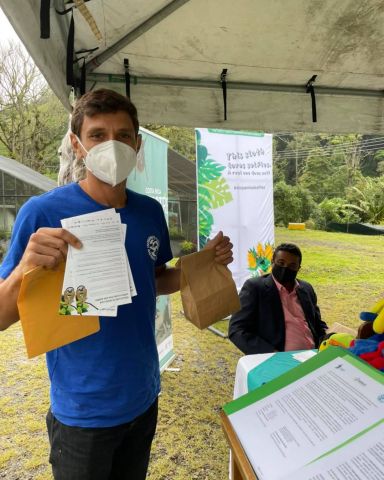
International Animal Rescue (IAR) has signed a formal agreement with the Ministry of Environment and Energy (MINAE) to support its Stop Animal Selfies campaign. #StopAnimalSelfies
The campaign promoted by MINAE and SINAC (the National System of Conservation Areas) in collaboration with civil society organizations and tourism companies, aims to raise awareness of the negative impact of photos showing people in direct contact with wildlife. Any image that shows an individual interacting inappropriately with a wild animal can have a serious detrimental effect on the wellbeing of wildlife all over the world by promoting the behavior and implying that it is acceptable.
Attending the official signing on behalf of the government were Minister of Tourism, Gustavo Segura, Deputy Minister of Environment Franklin Paniagua, Mayor of La Union Cristian Torres and representatives of businesses, civil society organizations and wildlife management groups including IAR.
Gavin Bruce, President of IAR Costa Rica, explained: “We fully support the government’s campaign to end the suffering of wild animals used as photo props. To give the very best chance of successfully releasing animals back to the wild, at IAR Costa Rica we have strict protocols in place that ensure the wildlife we rescue can be properly rehabilitated while minimizing human imprinting and habituation. Visitors to our center are not permitted to take selfies or interact with our rescued wildlife and all contact with wildlife is restricted to essential veterinary care. Holding, feeding, and taking selfies with wildlife promotes the exploitation and suffering of animals and is unacceptable. These wild animals are easily stressed and not at all suitable to be used as photo props,”
MINAE provides the following advice on how to help protect wildlife:
-
- Reject practices that allow you to take a selfie hugging or holding a wild animal, this promotes its exploitation, suffering, and its mishandling.
- Observe animals in a calm, respectful way and at a safe distance. Animals must be free in the wild, never chase them.
- Respect wildlife’s freedom, never catch, manipulate or remove them from their habitat. This is dangerous for you and compromises the life of animals, and is a crime.
- Respect their natural behavior and protect the health of wildlife, never feed them, attract with food or sounds.
- If for any reason wild animals are in captivity, do not enter their enclosures, do not touch, hug, feed, or manipulate them, this protects you from diseases or accidents such as attacks, bites, or scratches.
- Help them get back in the wild. Paying for experiences in rescue centers with animals in recovery eliminates their chances of returning to nature and promotes illegal activity.
- Book wildlife observation experiences with a responsible travel operator.
- Share this ethical code with family and friends or another tourist who wants to visit Costa Rica.
Members of the public are being encouraged to join the campaign by taking a picture of themselves with a stuffed animal and adding the caption: “I don’t harm wild animals for a selfie”, then sharing it on social networks with the hashtag #stopanimalselfies.
“We have had cases in our rescue center of wild animals that have been used as photo props,” Bruce added. “The result is that they have become habituated to human beings and no longer have the skills or instincts to survive in the wild. They are then condemned to a lifetime in captivity. It’s a very sad situation that can be avoided if members of the public and rescue centers act responsibly and put the animals’ needs above all else.”

